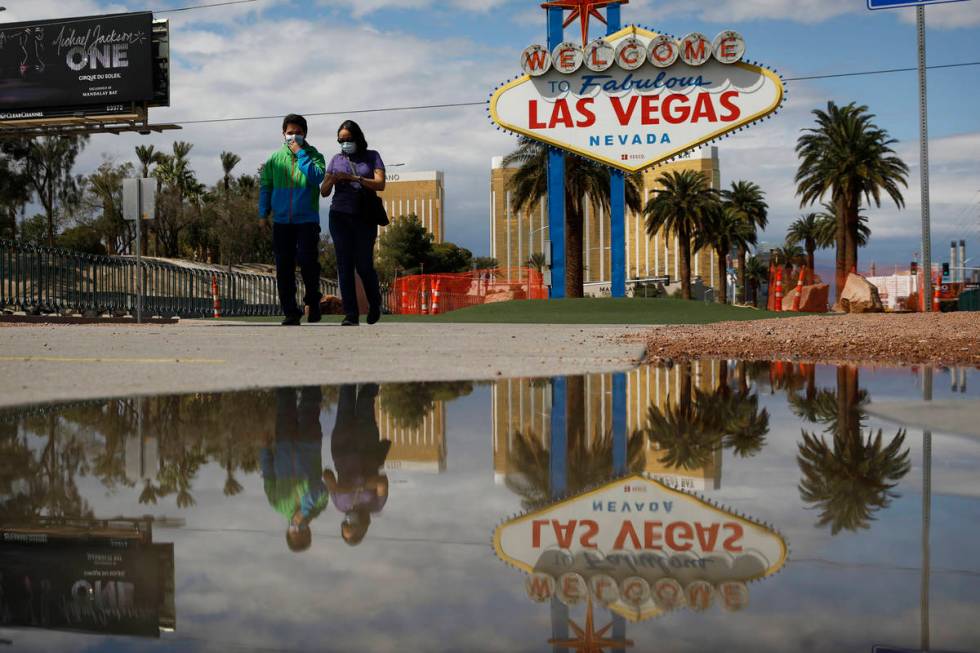Clark County data: Black residents more vulnerable to coronavirus

Black residents of Clark County are contracting the new coronavirus at a disproportionately high rate compared to their white, Hispanic and Asian counterparts — a trend being seen in cities across the U.S. — according to preliminary health data.
Black, non-Hispanic people, who make up about 11 percent of the county’s population, account for 19 percent of the county’s COVID-19 cases where patients’ race and ethnicity have been identified, according to data released Thursday by the Southern Nevada Health District.
The data represent a very early snapshot of the local outbreak. Still missing is race/ethnicity data for 42 percent of the positive cases in Clark County, and other state cases outside of the county.
Medical investigators have identified the race and ethnicity of only about 58 percent of the nearly 1,900 cases reported in Clark County because dozens of new cases are coming in daily, making it challenging to track detailed patient information.
Dr. Vit Kraushaar, a medical investigator for the district, said black residents could be seeing elevated infection rates because they have higher rates of underlying medical conditions, such as heart disease and diabetes, which can exacerbate the effects of COVID-19.
“If there’s a segment of the population that has more underlying medical problems, they’re more likely to be hospitalized and more likely to be tested,” Kraushaar said. “That’s just my hypothesis. At this point it’s too early to tell.”
A similar trend is raising alarms across the country.
Recent data from Chicago, New York City and Milwaukee show black people are being infected and killed by the virus at rates disproportionate to their share of the local population.
And in states where demographic information about COVID-19 deaths is publicly available, about 42 percent of the victims were black, according to an Associated Press analysis published Wednesday.
[ CDC Data: Coranavirus risk shown for those with diabetes, heart disease, smokers ]
Gov. Steve Sisolak said he has taken note of what is happening in other parts of the country, but he said Nevada has yet to conduct a similar analysis.
“The health care provided in our minority communities is nowhere near that of our more affluent communities.” he said during a press conference Wednesday evening. “It’s something we are looking at.”
Sisolak also said he was frustrated that local health districts were reporting COVID-19 deaths to the state in batches, instead of the day they occurred. The practice has created artificial spikes in death counts that the state was working to correct.
Disjointed efforts
Sisolak’s concerns reflect the disjointed efforts by Nevada’s state and local governments to disseminate data about the outbreak.
Statewide case numbers regularly outpace county-reported information, sometimes by a margin of more than 100 cases at the end of a day. On March 29, for example, the state reported over 200 more cases than individual counties had announced.
The statewide information is also broad, offering no specifics on the residency, race or underlying medical conditions of those infected with COVID-19. Also missing are estimates of how many of those sickened have been hospitalized or recovered — information that some counties are publicly reporting on a daily basis.
Shannon Litz, a spokeswoman for the Nevada Department of Health and Human Services, attributed the differences to how the state is gathering information.
The state is publishing numbers it receives directly from laboratories, she wrote in an email. That includes anyone who was tested in Nevada, including people who live outside the state. It does not include information on patient recoveries or hospitalizations.
More comprehensive data are being collected by local jurisdictions via a standardized questionnaire from the Centers for Disease Control and Prevention. However, that information isn’t always reflected in what those jurisdictions publicly report.
Clark County is sharing detailed information every day about the hospitalized and dead, such as specific underlying health conditions and whether they required intensive care.
Washoe County is not, but it is providing daily updates on the number of coronavirus patients who have recovered, a detail absent in Clark County’s daily reports.
“Nevada is not the only state struggling with this,” said Summer McGee, dean of the School of Health Science at the University of New Haven in Connecticut. “I’ve talked to folks from Texas and California, and everyone is grappling with these issues about what kind of data to collect and report.”
McGee said it is vital that public health officials share COVID-19 patients’ demographic data — including age, gender, race and ethnicity — and information about underlying medical conditions.
“In this case, it’s absolutely essential that communities have as much information as possible about who’s dying, who’s at risk and what the trends are in their communities,” she said.
In Nevada, officials say it’s likely that data will only be partially complete throughout the outbreak. Health district officials in Clark and Washoe counties say their staffs’ efforts are being hamstrung by the influx of new cases every day.
As of last week, the Southern Nevada Health District had about 50 people gathering information about county residents infected with COVID-19. Kraushaar said the district’s main focus right now is figuring out who the infected have had contact with, to stop the spread of the disease.
“As we’re seeing thousands of cases, it’s no longer really feasible to collect all that information on all those individuals,” Kraushaar said. “So we have to prioritize who we collect information from.”
Contact Michael Scott Davidson at sdavidson@reviewjournal.com or 702-477-3861. Follow @DavidsonLVRJ on Twitter. The Associated Press contributed to this report.